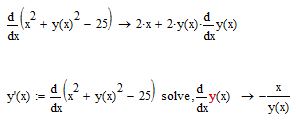- Subscribe to RSS Feed
- Mark Topic as New
- Mark Topic as Read
- Float this Topic for Current User
- Bookmark
- Subscribe
- Mute
- Printer Friendly Page
Implicit derivative?
- Mark as New
- Bookmark
- Subscribe
- Mute
- Subscribe to RSS Feed
- Permalink
- Notify Moderator
Implicit derivative?
How do I perform Implicit Derivative in MathCad?
I am trying to use MathCad Prime to solve an implicit derivative but I have no idea how I could do it. It seems to only solve a normal differentiation with only one variable.
Example:
x^2+y^2=25
dy/dx = -y/x
How do I get MathCad to work properly with implicit derivative?
Thanks!
Solved! Go to Solution.
- Labels:
-
Calculus_Derivatives
Accepted Solutions
- Mark as New
- Bookmark
- Subscribe
- Mute
- Subscribe to RSS Feed
- Permalink
- Notify Moderator
Mark Gase wrote:
I didn't know Mathcad could solve this way. To take it one step further, you can solve for dy/dx:
Yes and we don't even need to tamper with the original equation:

OR

OR better

Werner
P.S.: If you encounter problems or get 0 as result, check the labels of your variable and function names. Prime automatic labeling really is erroneous and annoying.
- Mark as New
- Bookmark
- Subscribe
- Mute
- Subscribe to RSS Feed
- Permalink
- Notify Moderator
Please post only once.
All, refer to the other post: https://community.ptc.com/t5/PTC-Mathcad/Help-with-implicit-differentiation/td-p/222787
- Mark as New
- Bookmark
- Subscribe
- Mute
- Subscribe to RSS Feed
- Permalink
- Notify Moderator
Thank you Mark.
But in Mathcad Prime I can't open .xmcd file and I can´t convert to .mcdx.![]()
- Mark as New
- Bookmark
- Subscribe
- Mute
- Subscribe to RSS Feed
- Permalink
- Notify Moderator
rking-2 wrote:
Thank you Mark.
But in Mathcad Prime I can't open .xmcd file and I can´t convert to .mcdx.
If you have a valid license for Prime, this license is also valid for Mathcad 15, so if you want to be able to convert files from MC15 and older to Prime format, you may download MC15 here -> Download PTC Mathcad 15.0 Free | PTC
It may be worth it and you need it to be able to do the conversions.
WE
- Mark as New
- Bookmark
- Subscribe
- Mute
- Subscribe to RSS Feed
- Permalink
- Notify Moderator
Why don't you attach a worksheet and screenshots of your attempts so we can see better what you are trying to do.
1) Mathcad unfortunately can't handle implicit functions, so you have to create one term by subtraction 25 from the LHS
2) You have to tell Mathcad that y ist a function dependend on x by writing y(x)

Hope this is what you are looking for.
WE
- Mark as New
- Bookmark
- Subscribe
- Mute
- Subscribe to RSS Feed
- Permalink
- Notify Moderator
I didn't know Mathcad could solve this way. To take it one step further, you can solve for dy/dx:

- Mark as New
- Bookmark
- Subscribe
- Mute
- Subscribe to RSS Feed
- Permalink
- Notify Moderator
Mark Gase wrote:
I didn't know Mathcad could solve this way. To take it one step further, you can solve for dy/dx:
Yes and we don't even need to tamper with the original equation:

OR

OR better

Werner
P.S.: If you encounter problems or get 0 as result, check the labels of your variable and function names. Prime automatic labeling really is erroneous and annoying.
- Mark as New
- Bookmark
- Subscribe
- Mute
- Subscribe to RSS Feed
- Permalink
- Notify Moderator
Many thanks Werner, is so usefull your answer.
- Mark as New
- Bookmark
- Subscribe
- Mute
- Subscribe to RSS Feed
- Permalink
- Notify Moderator
Thank you all, I will be more careful to publish my questions.





